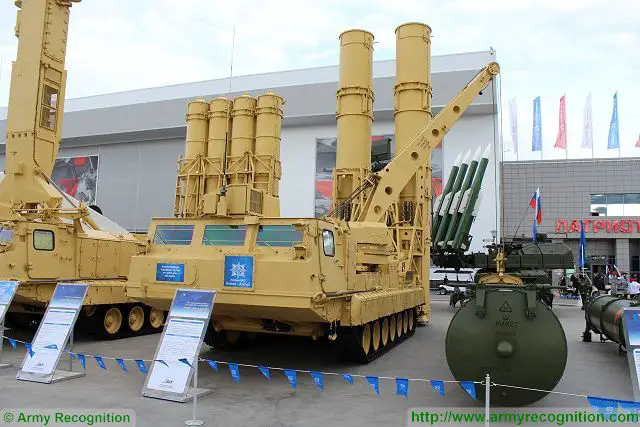Breaking news
Russian air defense missile systems S-300V4 to be deployed in the Kaliningrad Region 12704173.
| 2017
|
|
|||
|
Defense & Security News - Russia
|
|||
|
|
|||
| Russian air defense missile systems S-300V4 to be deployed in the Kaliningrad Region. | |||
|
The Russian Defense Ministry is converting the air defense (AD) division of the Baltic Fleet to the S-300V4 (NATO reporting name: SA-23 Gladiator/Giant) advanced super-long-range surface-to-air missile (SAM) system, according to the Izvestia daily.
|
|||
|
|
|||
 S-300V4 launcher unit at Army-2016 International Military Technical Forum near Moscow. |
|||
|
|
|||
|
The large unit stationed in the Kaliningrad region provides air defense for industrial installations, social infrastructure, military units and warships against enemy strike aircraft, cruise missiles and unmanned aerial vehicles. Owing to its long-range hypersonic SAMs, the S-300V4 can engage threats out to 400 km. According to experts, the sophisticated AD missile system will serve a vital element of the security of Kaliningrad.
The Russian Navy has told Izvestia that the regiments of the 44th Air Defense Division of the Baltic Fleet began to switch over to the S-300V4 early this year. Their personnel has been receiving new systems and learning to use them. "The S-300V SAM system is often mistaken for the S-300PM [SA-10 Grumble] and PMU, but they are unlike as chalk and cheese," expert Anton Lavrov says. "The S-300V is an Air Defense Artillery system. It defends vehicular convoys, field artillery positions and headquarters, while the ‘ordinary’ S-300 covers key industrial facilities, bridges, dams and electric power plants. The S-300V is more maneuverable, with virtually all of its vehicles being tracked. Each S-300 battery has a radar that acquires targets and illuminates them for missiles, and the S-300V has a radar like that mounted on each of its launchers." The S-300V entered Soviet Army service in 1988. The US-made Pershing ballistic and Tomahawk cruise missiles topped its priority target list. Therefore, the system had missile launchers of two types - one to fire short-range SAMs and the other long-range ones. The S-300V detects threats by means of a sector radar. Unlike other radars traversing 360 deg., the sector radar scans one direction only. However, it sees targets farther out and acquires them more quickly and accurately. The S-300V4 is essentially a different SAM system. It is equipped with up-to-date digital radar control systems. The Russian Army furnished its first brigade with S-300V4s in 2014. The S-300V4’s arsenal was beefed up with advanced SAMs in 2015. The new long-range missile travels at hypersonic speed (about 9,000 km/h) out to 400 km for a kill, while the short-range SAM intercepts small fast hard-jinking targets within the 150-km radius. "The S-300V4 is an up-to-date reliable long-range system," Lieutenant General Alexander Gorkov, former commander of the Air Defense Missile Force, has told Izvestia. "Combined with other AD assets deployed in Kaliningrad, it will serve a most important element of the nonstrategic missile defense of the area. The S-300V4 systems are effective against both ballistic and air targets." The 44th Air Defense Division is among the latest AD large units of the Russian Army. It was stood up on December 1, 2014 on the basis of the 3rd Aerospace Defense Brigade and headquartered in the town of Gvardeisk (Kaliningrad Region). The division comprises the 183rd and 1543rd Missile Regiments and 81st Radio-Technical Regiment. The units provide air defense for the Baltic Fleet’s units and ships and the Kaliningrad Region’s key industrial and social installations, according to the Izvestia daily. |
|||
|
|
|||
|
© Copyright 2017 TASS. All rights reserved. This material may not be published, broadcast, rewritten or redistributed.
|
|||



















